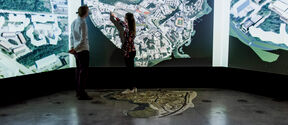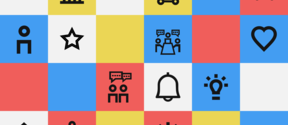Nominate your candidate for the 2025 Award for Achievements in Teaching at the School of Engineering
Staff and students of the School of Engineering are invited to nominate candidates for the 2025 Award for Achievements in Teaching.

Every year, the School of Engineering honours a teacher or group of teachers for meritorious teaching work with the Award for Achievements in Teaching. The school's students and staff are invited to submit their nominations for the award annually. The winner of the award is decided by the dean based on a proposal by the vice dean for education.

Staff and students of the School of Engineering are invited to nominate candidates for the 2025 Award for Achievements in Teaching.
Previous winners of the award can be found below, along with the grounds for their selection.
Pauliina Pietiläinen from Learning Services and Raine Viitala from the Department of Energy and Mechanical Engineering were awarded the 2024 award in recognition of their determined efforts to revising the bachelor's thesis process at the School of Engineering. Pauliina and Raine have developed the processes related to the thesis by actively involving students, teachers, and administrative staff. The result is an efficient and meaningful process with highly promising outcomes.
University Lecturer Tom Gustafsson from the Department of Mechanical Engineering received the 2023 Award for Achievements in Teaching in recognition of his contributions to bachelor's-level mechanics education, in particular for his student-centric approach to teaching and his work on the department's 350-student Statics course.
Henry Gustavsson, Department of Civil Engineering, has a long experience in teaching geoengineering at Aalto University. Since 2016 he has been the responsible teacher of the Project Course in Geoengineering, and the success of the course has been based on a strong cooperation with stakeholders in the field.
During the course, students carry out group work that successfully simulates working life. The working methods correspond to the real practices of the field, and the industry professionals visiting the course guide the students' work according to the latest operating methods.
Since 2016, Karvinen has been responsible for the development, implementation and management of the Water and Environmental Engineering programme (WAT) personal learning portfolio which allows students to reflect and document their learning together with their peers. To enhance peer support among students finalizing their studies, Karvinen has established and coordinated online master's thesis writing sessions. In addition, Karvinen has successfully supported her peers in the transition to online teaching and provided ideas for more engaging online teaching and learning. Karvinen has already for years done both research and practical work related to the role of sustainability in engineering education and university education. While her work has particularly focused on activities within WAT Master’s programme, her experience has been utilized also for both the School of Engineering and Aalto University. Karvinen has been part of the cross-Aalto team implementing a first-ever pedagogical training course on “Sustainability in Teaching”.
Dr. Annukka Santasalo-Aarnio and Dr. Samuel Cross have designed and implemented Challenge-based education with industry and societal impact in an online environment. Santasalo-Aarnio and Cross are front runners for challenge-based education, and they have developed new tool and method in 2020 to facilitate conducting three courses in an online environment. Cooperation with stakeholders is solid and diverse. Both teachers’ teaching competence has been advanced significantly by learning from each other.
The working group for the award would also like to extend their thanks to all teaching and teaching support personnel for their flexibility, level of commitment and excellent work during the difficult time of the pandemic.
Lauri Uotinen and Mateusz Janiszewski used new technology to develop a virtual reality (VR) learning environment. They worked with teachers from different disciplines to create a virtual underground tunnel that allows students to perform exercises at their own pace and try them as many times as they want before entering the actual tunnel environment. Instructions are available to students throughout.
Along with their development work Uotinen and Janiszewski have conducted research into teaching by studying the utility of the VR learning environment from the point of view of students and learning. The VR environment supports student well-being by providing support and flexibility in the learning process. Their research also shows that learning outcomes have improved and the environment has been further developed with the help of student feedback.
Tommi Mikkola's approach to teaching and learning is centred on learning and the student. He cares for his students and supports them and their learning in many ways. His work and style of teaching improve students' motivation and leave and impression that the student is not alone. In his teaching work, Mikkola uses a diverse selection of teaching methods and offers students alternative ways of completing exercises as well as challenges for students of differing levels. His courses are well organised and their grading criteria are presented clearly and in advance, which helps students deal with the workload and manage their time. He has been able to comprehensively develop teaching in his field in the School of Engineering.
Mikkola has also developed himself as a teacher by completing the 25-credit course of pedagogic education at Aalto University.
Matti Kummu has designed and implemented a new course, Water and People in a Changing World, which is a part of the Master's Programme in Water and Environmental Engineering. Student feedback has shown that the course excels in supporting students' learning. It combines the technology expertise of engineer education with a wider societal context and thus trains future game changers as per the strategy of Aalto University.
Despite the challenging subject matter, the course offers students a view into how the teaching given in the master's programme and the School of Engineering provides the kinds of expertise needed in solving global sustainability issues.
The course combines lectures, solo exercises, project work, peer support and workshop activities in an innovative and diverse fashion.
As a teacher, Eeva Säynäjoki works by paying attention to students as well as their needs and expectations. She adapts to different types of learners by applying a variety of methods to teaching, learning and completing exercises. Her approach to teaching and learning is focused on learning and students appreciate her readiness to accept and willingness to apply the feedback students give. Säynäjoki collects student feedback on her teaching on a continuous basis and uses feedback to develop her work even before the course is over.

A landing page for teachers to help them find information, services, and support related to teaching and learning.

The programme director's handbook is a collection of guidelines, templates, and good practices. The handbook gathers together information about processes, schedules and tools and the aim is to support degree programme directors, heads of majors and others involved to succeed in implementing, evaluating and developing the degree programmes.

Information, training and services to help us in building a community where everyone belongs.